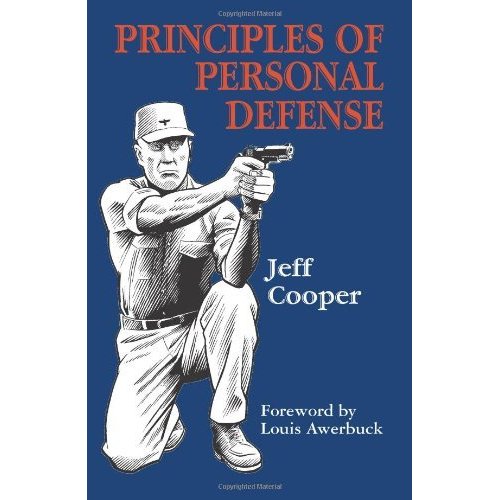“In war there is no substitute for victory, and this is equally true of personal combat, which is, after all, a microcosm of war. When a coward is offered deadly violence, his reaction may be to surrender, or cower, or flee, or call for help; not one of these choices is likely to obviate his peril.
But this booklet was not written for cowards.” -Jeff Cooper
In reading game blogs you may have come across the term “lizard brain”, referring to your primal instincts and subconscious. It’s often used in the context of pick-up when describing the raw desires and masculinity that is so appealing to women. Another instincts as primal as the need to procreate is survival. Colonel Jeff Cooper’s Principles of Personal Defense is the best available overview of a survival/combat mindset in existence. The strength of the book is in its singular focus on development of the mindset necessary to survive a violent encounter. The book is short but very dense in actionable information that you can immediately incorporate into your daily routine.
Jeff Cooper was an expert on small arms and inventor of the Modern Pistol Technique. He served in the Marines during World War II and the Korean War. While advising the Nicaraguan military in the 1970s, Cooper taught a series of principles which became the basis for Principles of Personal Defense.
The Principles described in the book are: Alertness, Decisiveness, Aggressiveness, Speed, Coolness, Ruthlessness and Surprise. Each principles is explained in several pages, including personal anecdotes and practical advice.
I’ve incorporated much of Colonel Cooper’s advice into my daily routine. In the chapter on alertness Cooper outlines what he calls “a tactical approach to life.” I’ve gotten into the habit of swinging wide when walking around corners and getting something solid behind me when I pause on the street. I try to never let someone approach me from behind. I’ve gotten into the habit of running “What would I do if?” hypothetical scenarios in my mind as a form of practice. This could include imagining your reaction to someone who’s walking in your direction, attacking you. How would you position your feet? Where would you strike back? etc.
The book is also a good introduction to thinking of personal defense in a holistic way. There is no one fighting system or martial art that is superior in every situation. Being trained with firearms, a dynamic martial arts system and developing a combat mindset are all important facets of your personal safety.
While he doesn’t explicitly describe this in the book, Cooper developed whats been termed the “Cooper Color Code” as a system to differentiate levels of readiness which influence a combat mindset, the most important weapon at our disposal. I strive to stay in “Yellow” a relaxed alert where I stay aware of the possibility that I may need to defend myself today.
Though this is a short work, I can’t recommend it enough for the wealth of information it contains. I think all readers, including those with martial arts and self defense training, will greatly benefit from Colonel Cooper’s wisdom. The books message is that our personal security is not only our own highest obligation, but that decisive and aggressive resistance to criminal violence is among the greatest responsibilities of a free citizen.
Buy Principles of Personal Defense by Jeff Cooper
Additional Reading: Jeff Cooper’s Commentaries





